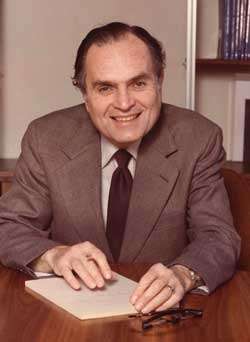William Pollin
William Pollin was a prominent figure in the field of psychiatry and public health, known for his extensive work in the areas of drug addiction, mental health, and the administration of public health initiatives. Throughout his career, Pollin made significant contributions to the understanding and treatment of drug addiction, advocating for a comprehensive approach that combined medical, psychological, and social strategies.
Early Life and Education[edit | edit source]
William Pollin was born in the early 20th century in the United States. He pursued his higher education in the field of medicine, specializing in psychiatry. His early interest in mental health issues laid the foundation for his future career, where he would focus on the complexities of addiction and the need for integrated treatment approaches.
Career[edit | edit source]
Pollin's career was marked by his dedication to public health and his efforts to improve the treatment and perception of individuals suffering from drug addiction. He held several key positions in public health institutions, where he was instrumental in developing policies and programs aimed at addressing the root causes of addiction and providing support for those affected.
One of his notable roles was as the director of the National Institute on Drug Abuse (NIDA), where he championed research into the biological, psychological, and social aspects of drug abuse. Under his leadership, NIDA funded numerous studies that advanced the understanding of how addiction affects the brain and behavior, leading to more effective treatment methodologies.
Contributions to Psychiatry and Public Health[edit | edit source]
Pollin's work in the field of psychiatry and public health was characterized by his holistic approach to addiction. He believed that effective treatment required not only addressing the physical aspects of addiction but also understanding the psychological and social factors that contribute to it. This perspective was influential in shifting the discourse around drug addiction from one of moral failing to a recognized medical condition that requires a multifaceted treatment approach.
Throughout his career, Pollin published several influential papers and articles that explored various aspects of addiction and mental health. His research contributed to a better understanding of the genetic and environmental factors involved in addiction, paving the way for more personalized and effective treatment strategies.
Legacy[edit | edit source]
William Pollin's legacy in the fields of psychiatry and public health is enduring. His pioneering work in the understanding and treatment of drug addiction has had a lasting impact, influencing current practices and policies in the treatment of addiction. His advocacy for a comprehensive approach to addiction treatment continues to inform public health strategies and research in the field.
Pollin's contributions were recognized through numerous awards and honors throughout his career, reflecting his significant impact on the fields of psychiatry and public health.
See Also[edit | edit source]
Search WikiMD
Ad.Tired of being Overweight? Try W8MD's physician weight loss program.
Semaglutide (Ozempic / Wegovy and Tirzepatide (Mounjaro / Zepbound) available.
Advertise on WikiMD
|
WikiMD's Wellness Encyclopedia |
| Let Food Be Thy Medicine Medicine Thy Food - Hippocrates |
Translate this page: - East Asian
中文,
日本,
한국어,
South Asian
हिन्दी,
தமிழ்,
తెలుగు,
Urdu,
ಕನ್ನಡ,
Southeast Asian
Indonesian,
Vietnamese,
Thai,
မြန်မာဘာသာ,
বাংলা
European
español,
Deutsch,
français,
Greek,
português do Brasil,
polski,
română,
русский,
Nederlands,
norsk,
svenska,
suomi,
Italian
Middle Eastern & African
عربى,
Turkish,
Persian,
Hebrew,
Afrikaans,
isiZulu,
Kiswahili,
Other
Bulgarian,
Hungarian,
Czech,
Swedish,
മലയാളം,
मराठी,
ਪੰਜਾਬੀ,
ગુજરાતી,
Portuguese,
Ukrainian
Medical Disclaimer: WikiMD is not a substitute for professional medical advice. The information on WikiMD is provided as an information resource only, may be incorrect, outdated or misleading, and is not to be used or relied on for any diagnostic or treatment purposes. Please consult your health care provider before making any healthcare decisions or for guidance about a specific medical condition. WikiMD expressly disclaims responsibility, and shall have no liability, for any damages, loss, injury, or liability whatsoever suffered as a result of your reliance on the information contained in this site. By visiting this site you agree to the foregoing terms and conditions, which may from time to time be changed or supplemented by WikiMD. If you do not agree to the foregoing terms and conditions, you should not enter or use this site. See full disclaimer.
Credits:Most images are courtesy of Wikimedia commons, and templates Wikipedia, licensed under CC BY SA or similar.
Contributors: Prab R. Tumpati, MD

